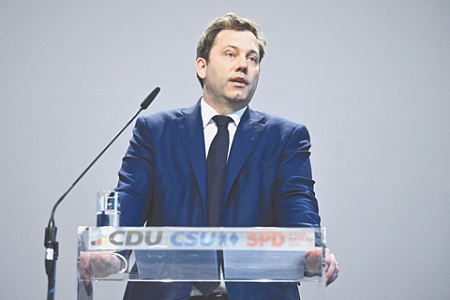
The co-chairman of the Social Democratic Party of Germany (SPD), Zaskia Esken, has resigned. At the suggestion of Lars Klingbeil, Vice Chancellor and Minister of Finance in the government of Friedrich Merz, the former president of the Bundestag, and now Minister of Labor and Social Affairs Berbel Bas, was recommended for this post. At the same time, Tim Klessendorf, a 33-year-old politician from Lubeck, became the general secretary of the SPD responsible for organizational work. He replaced Matthias Miersch, who headed the SPD faction in the Bundestag. All these politicians are considered to be representatives of the left wing of the party. Just like the SPD co-chairman Klingbeil himself.
In this regard, Stern magazine wonders whether changes in the leadership of the SPD can help it “get out of the hole” in which the party found itself under the government of Chancellor Olaf Scholz, when it was able to get only 16% of the vote in the early elections in February this year, and in the new Bundestag it came in third place. This circumstance allowed the magazine to claim that the party is in crisis.
Scholz himself, by the way, remains a simple deputy in the SPD faction in the new Bundestag. However, all the changes that have taken place are temporary and will have to be approved by the party congress, which will meet in June.
In connection with the permutations, two circumstances should be noted. First, it is an almost complete renewal of the leadership of the SPD. Of the old party members, only Defense Minister Boris Pistorius remains, who is likely to join the new board at the June congress. His position is saved by his consistently high rating among the country’s political figures.
Secondly, the concentration of power in the hands of Lars Klingbeil is becoming obvious. He intends to remain co-chairman of the SPD and at the upcoming congress invite delegates to vote for a duumvirate at the head of the party. He chose Bas as his partner, which represents the largest party organization in North Rhine-Westphalia and has already received a direct deputy mandate five times in a row, winning federal elections in its constituency. To avoid possible accusations of combining party and government positions, he chose the current minister as a partner.
Klingbeil himself prefers to present the ongoing changes as a rejuvenation of the party leadership. Although the new general secretary can only be called young. Both 57-year-old Bas and 54-year-old Klinbeil tend to be middle-aged party officials. Therefore, it is more about the concentration of power in the SPD in the hands of Klingbeil than about the rejuvenation of the leadership.
The party has so far avoided naming those responsible for the failure in the last federal election. It is believed that the circumstances in which Scholz was placed as head of government due to Russia’s actions in Ukraine are to blame. Scholz had to make a number of decisions in this regard, including in coordination with Brussels, which had a negative impact on Germany’s economic development. First of all, we are talking about the abandonment of Russian gas.
So far, Rolf Mutzenich, the former head of the SPD faction in the Bundestag, has assumed direct responsibility for, one might say, the worst result in all the past elections. He resigned immediately after the announcement of the results of the vote.
The resignation of the former co-chairman of the Esken party now means that she is likely to be blamed for the poor preparation and failure of the SPD in the early elections.
The strengthening of Klingbeil’s position due to the combination of the posts of party chairman and vice-chancellor indicates his bid for leadership in the party and nomination for the next election in 2029 for chancellor of Germany from the SPD.
